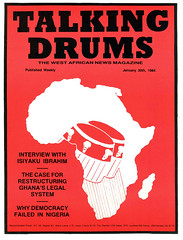Comment - An Unequal Equation
But surely the basis for the comparison is faulty? The question of government bureaucracy needs to be examined first.
The new military government in Nigeria has said that the country will save N88.8 million a year as the salary that would have been paid to members of the disbanded National Assembly and this without reckoning the salaries of their aides and other perks of office; that is a lot of money to come into the national treasury.
Elected officials in Africa do tend to be over generous when it comes to voting money for themselves.
They were guilty of that in Ghana and they were guilty in Nigeria. But supposing that the salaries of National Assembly members had been half what they were receiving and thus not likely to have attracted public resentment, that would still mean at least N44.4 million left for the military government to spend, and such "savings" can be found in a wide range of places.
The laws under which civilians govern require them to have parliaments, National Assemblies, etc and committees cannot function without researchers and secretaries.
It is not for nothing that the first thing that the military does on assuming power is to throw out the constitutions that in many cases had been fashioned and handed over to the civilians by the military and out with the constitutions go a lot of institutions which civilian rule cannot function without and whose absence then are proclaimed as thrift and money saving policies by the military.
Even more important than the "savings" that can be made is the absolute power that comes with military rule. With one wave of an officer's walking stick, a law decree as they become comes into being and with one radio announcement an entire community can be transformed from fishermen to farmers.
Without constitutions to guarantee individual freedoms, the citizen has no defence against violations to his rights and as has been stated in these columns before, people also have tendencies not to be as brave or courageous in standing for their rights when there are guns on the streets.
For the military to demonstrate convincingly that they are indeed better at ruling than the civilians, why don't they try ruling under the same conditions and regulations that the inept civilians do?
It is of course very easy to be popular with the citizenry when you can break into warehouses and enter markets to force prices down, the sense of euphoria that comes with buying a bag of rice for N20 when it had been on offer for N90 and when the recommended price is N30, is unimaginable. The military might consider how laws can be made under constitution by a radio announcement or in a speech to enthusiastic students. They might also want to educate future aspirants to political power how to clamp an entire country under curfew for whatever length of period they decide to be necessary.
Much education will be required for example on the whole subject of the protection and upholding of basic freedoms while moving with enough speed in decision taking to satisfy the aspirations of a population in a hurry, in much the same way as it will be helpful to show how suspects of any and every imaginable crime can be kept in jail for whatever length of period without charge nor access to counsel and the government will still not fall foul of the constitution or some brave lawyer would not slap a writ of habeas corpus and an equally courageous court tell the government to jump off into the sea.
Democracy has never come cheap to any society and while it should be said that extravagance is unforgivable in countries where the greater majority are steeped in poverty, there is a certain basic structure that cannot be avoided and it is hardly fair that part of the charges to damn civilian rule with should be the money that can be "saved" by demolishing these structures.
It is not unthinkable that an impressive sum will be saved by the country if the position of "batman" were abolished in the military, and to the uninitiated, "batmen" look like an extravagant perk to senior military officers even if it is possible that a persuasive case can be made for their existence.
The London Financial Times last week carried a wide range survey on Nigeria and part of it was an interview with the Head of State Major General Muhamadu Buhari The reporter asked the General: "Don't you think it is one of the strengths of Nigeria, that you have such a vigorous Press, even if you sometimes feel they are a bit of a nuisance?" He answered: "I think it is a weakness.)
It is not unlikely that this brief exchange provided clearer insight into the psyche of military officers and their attitude to government than anything else.
One of the basic principles of constitutional rule is the presence and encouragement of a free and vigorous press. The military in Africa will have to end their priceless lesson in the art of government by demonstrating that they can and will rule with a critical, cynical and questioning press.
When they have been able to do all these for even a six month period, they can tell the world and the shamed civilians there you are, go ye forth and do likewise.
The checks and balances that are built into constitutions tend to slow governments down and are doubtless only protection the individual has against arbitrariness and capriciousness by government.
The "savings" that become headlines today only mean that power recedes even further from the people. Until the day that the military are able to govern under the same conditions as the civilians they overthrow, there is little hope of balancing the equation.
